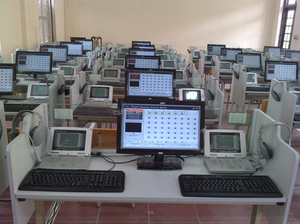Understanding Digital Language Lab
A digital language lab is an innovative educational tool designed to facilitate language learning through advanced technology. By integrating multimedia resources, real-time communication, and interactive activities, these labs create an immersive environment that enhances language acquisition. Whether for academic institutions or corporate training, a digital language lab transforms traditional language teaching methodologies into engaging and effective learning experiences.
Types of Digital Language Lab Systems
There are several types of digital language lab systems that cater to different educational needs and environments:
- Client-Server Model: This system employs a central server that manages language lab resources and connects multiple client workstations. It allows for collaborative learning and monitoring of student progress.
- Standalone Workstations: Ideal for smaller institutions, standalone systems consist of individual computers equipped with language lab software allowing self-paced learning.
- Cloud-Based Solutions: These modern digital language labs utilize cloud technology, enabling remote access to resources anytime, anywhere. Ideal for distance learning programs, they promote flexibility and accessibility.
- Virtual Language Labs: Utilizing virtual reality (VR), these labs offer an immersive environment where learners can practice speaking and listening in simulated real-life scenarios.
Applications of Digital Language Labs
Digital language labs are highly versatile, catering to various academic and professional settings. Their common applications include:
- Schools and Universities: Enhancing language courses with multimedia content and interactive exercises.
- Corporate Training: Supporting employee training programs that focus on language skills for global business communications.
- Online Learning Platforms: Offering remote learners access to structured language courses through digital platforms.
- Language Testing Centers: Providing reliable assessments and certifications in language proficiency.
Features and Advantages of Digital Language Labs
Digital language labs offer numerous features that significantly enhance the learning experience, including:
- Interactive Learning: Engaging students through multimedia presentations, quizzes, and exercises while allowing for real-time feedback.
- Voice Recording and Playback: Students can practice pronunciation by recording their voices and comparing them with native speakers, which aids in improving speaking skills.
- Monitoring and Assessment Tools: Instructors can track student progress and provide targeted help based on performance metrics.
- Customizable Content: Teachers can tailor lessons according to the specific needs and proficiency levels of their students, ensuring personalized learning paths.
- Collaborative Learning: Features like group discussions and pair exercises promote peer interaction and language use among learners.
By adopting digital language labs, educational institutions and organizations can foster deeper engagement, enhance language proficiency, and create a more dynamic learning environment that prepares learners for global communication success.








































